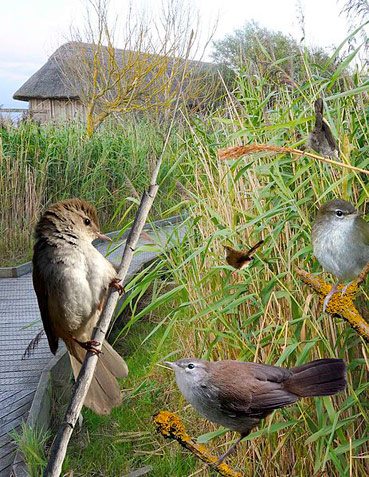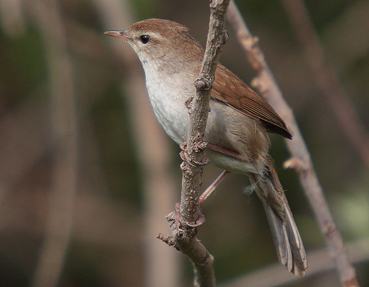3 calling birds: Cetti’s Warblers in a bush
In the course of an average week-long birding tour around many parts of Spain it is quite usual to come across a number of Cetti’s Warblers, usually more than one at a time. However, even if encountered on every day of the trip we are rarely regaled with the possibility to observe the Cetti’s Warbler for more than a second or two. It’s a skulking bird which sings loudly and explosively from the depths of the thicket or undergrowth. One particular morning springs to my mind when we must have heard close to 50 different birds, without spotting even one of them.
So imagine my surprise and appreciation when I came across no fewer than 3 Cetti’s Warblers together out in the open while I was on a gentle walk at our local municipal park. I stopped in my tracks to watch these 3 birds, which were more engaged with each other than concerned by my proximity. All 3 were calling, cocking their tails, strutting on branches at a couple of metres from the ground and flicking or quivering their wings.
This was obviously a bid for local power, a territorial dispute, the importance of which was perhaps paramount to these birds at this particular moment in their lives. For some brief moments I was the spectator of a natural avian drama, and standing still I was anticipating watching the development and outcome of this show-down.

Cetti’s Warblers: By Richard Crossley (The Crossley ID Guide Britain and Ireland)
Unfortunately, the bird I shall unimaginatively call Cetti’s 1, the one nearest to me, flew off into cover just the other side of the canal to where I was standing. I had the distinct feeling that his departure was premature, and provoked, almost certainly by my presence.
Unperturbed, Cetti’s 2, the bird in the middle, called loudly again and received no answer from Cetti’s 1 (departed), and a muted response from Cetti’s 3, now further away and no longer quivering his wings. Cetti’s 2 had prevailed, and as such sang out his victory call louder than ever, with no competitor prepared to answer him back.
To me it was clear that I had witnessed Cetti’s 2 victory and that that patch of vegetation next to the path would be his for the time being, perhaps for the whole of the breeding season.
It also appeared to me that my presence there, if you like as a birder, although I wasn’t “out birding”, may have had a direct influence on the outcome of their confrontation. Whether or not Cetti’s 2 would have won without my passing we have no real way of knowing, but just for the sake of it let’s indulge in some speculation and see what conclusions (admittedly tentative) we can draw.

Cetti’s Warbler Cettia cetti
Theory 1: Cett’s 1 or Cetti’s 3 would have won the dispute had I not come along.
Therefore 1 or 3 would have established this area as part of their territory. However, if they are so easily spooked by passing humans then their foraging and subsequently breeding success is likely to be negatively affected by this factor, seeing that this is a frequently used path by many park-goers, joggers, cyclists, dog walkers, passers-by, etc. So if 1 or 3 were so susceptible to human disturbance it’s unlikely they would have ever been successful there anyway, and it would have been better for Cetti’s 2 (less easily spooked) to have stayed.
Theory 2: Cetti’s 2 would have won anyway, so my presence had no real effect on the bird’s selection and control of territory and its potential breeding success.
That’s fine, as long as you only correlate breeding success to disturbance and susceptibility to disturbance. But that’s obviously not the case. Supposing, for example, that Cetti’s 2 was the least effective forager of the 3 birds, or the least attractive mate, and only won because I disturbed the others. Cetti’s 2 would then attempt to breed in this patch of territory, and may even fail, its resistance to disturbance being no advantage to it when compared to the “other” skills, traits and fitness shown by birds in territories without disturbance. Perhaps 1 or 3 would have been more successful, able to find more food, make better use of the territory, attract a healthier female, and with subsequent overall positive breeding success.
Then a bolder, less skulking, bird may be easier prey to a Sparrowhawk; or is it a safer territory, due to the presence of passing humans, and which is therefore largely avoided by such predators?
What about “displaced” individuals 1 and 3? Couldn’t they then go on to dispute with their respective neighbours? And with very unpredictable results? For example, one or more of their neighbours then rebounding to dispute 2’s territory.
I’m still trying to get my head around all of this. Does anyone want to add any more possibilities or insights?
The idea is to allow just a small insight into the complexity of environmental science and ecology, and how we humans are influencing just about everything, no matter how respectful we try to be.
Leave a Reply